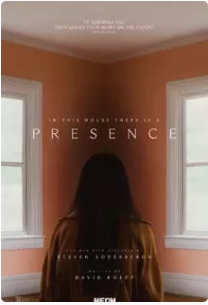
Story: The couple, along with their youthful son and grieving daughter, move to a new home without knowing that the supernatural unit is watching them.
Review: “Presence” qualifies as a family drama rather than a horror film, and the action unfolds from the camera’s perspective. The film is faithful to classic indie filmmaking. He sticks to a minimal lineup, a close environment within the house, and a spirit of spending most of his time as a quiet observer, sometimes intervening. Given the lack of thrills, creepy moments, and even the lack of basic diving, it’s confusing why the film was sold as a horror experience. Steven Soderbergh’s reconciliation with this genre is unconventional, but it’s not about delivering something truly unforgettable. All that remains is a fascinating film experiment that can only run a selected group of audiences, but can disappoint those who are hoping for real fear.
The film is about Rebekah (Lucy Liu) and Chris (Chris Sullivan), a couple who move into a new home with young children (Callina Liang) and Tyler (Eddy Maday). Chloe laments the loss of her best friend Nadia, who is supposed to have died of a drug overdose. She feels an invisible unit in her room, but she is not afraid of it. The story unfolds from this entity’s perspective, with the camera itself acting as a “being” and implicitly observing the family’s battles. As the family lives at home, the tension of Rebekah and Chris’ prejudice begins to disguise, Chloe’s sadness takes on awkward form, and Tyler gathers in a growing up of solitude, but the entities remain quiet and careful viewers. However, when Tyler’s friend Ryan is interested in Chloe, his presence becomes more clear. Strange events escalate, making the family aware of the existence of supernatural powers in their homes.
The highlights of existence are fascinating, but when the true identity of the entity was revealed, the film lost its audience commitment. As a pure drama, it works well – Rebekah and Chris’ marriage tension, Chloe’s psychological battle with grief, and Tyler’s quest for friendship. The moment it gets caught up in fear, the story begins to disguise itself. The script by David Kep, known for “Jurassic Park,” “Mission: Impossible,” and “Caritosway,” has a notable gap in the script. Chloe saves Entity when Ryan places his drink once, but later does not help her in a similar situation.
During the entire film, the supernatural elements are primarily passive and do not take full priority over family drama.
Lucy Liu and Chris Sullivan offer reliable results, like Rebekah and Chris, couples dealing with long-married tribes. Li shines as an openly scattered mother with her son, while also maintaining a distant relationship with her daughter. Sullivan brings his role as an intentional but fighting patriarch. But Karina Lean as Chloe truly stands out, offering an understated but powerful expression of a young girl consumed by grief.
As an experimental film, “existence” brings about several interpretations. It contradicts the typical ghost story conventions that distribute traditional horrortropics. If Soderbergh is considered drama only, he will make camera work, room use and the use of attractive characters an appealing atmosphere. The film is a brave and innovative attempt, but his limitations prevent it from affecting it.